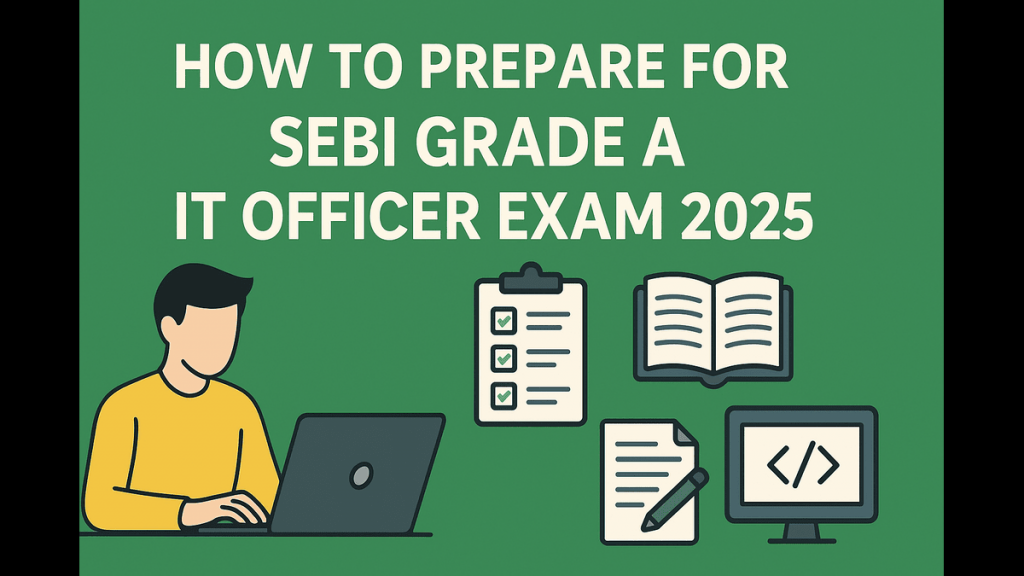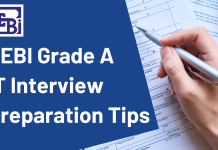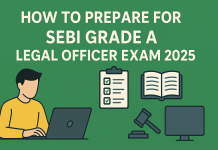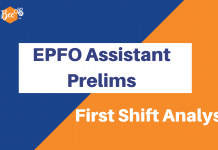Preparing for the SEBI Grade A IT Officer Exam 2025 demands more than routine memorization or checklist-style studying. It requires strategic planning, conceptual understanding, and consistent practice, along with the persistence to continue even when preparation feels repetitive.
If your goal is to qualify for the SEBI Grade A IT Officer position in 2025, it helps to focus not just on what to study but how to study. Let’s explore the exam structure, effective strategies, and practical study methods that convert steady effort into tangible results.

Understanding the SEBI Grade A IT Officer Exam
The SEBI Grade A (Assistant Manager) recruitment for the Information Technology (IT) stream takes place in two stages—Phase I and Phase II—followed by an interview. Each phase evaluates both technical expertise and general aptitude.
The SEBI Grade A IT Officer 2025 syllabus includes programming, databases, data analytics, networking, cybersecurity, and algorithms. Alongside these, candidates are also tested on reasoning, quantitative aptitude, English, and general awareness.
SEBI Grade A IT Officer Exam 2025 Phases and Focus Areas
| Phase | Paper/Section | Key Focus Areas |
| Phase I | Paper 1 | Reasoning, Quantitative Aptitude, English, General Awareness |
| Paper 2 | Technical: Programming, Data Structures, Algorithms, DBMS, Networking, Cybersecurity | |
| Phase II | Paper 1 | Descriptive English (Essay, Comprehension, Precis) |
| Paper 2 | Advanced IT topics and problem-solving | |
| Interview | – | Personality assessment, regulatory awareness, communication skills |
The technical section carries substantial weight. Topics such as programming, data structures, algorithms, and networking constitute the core of the technical paper, and thus require deeper and more consistent preparation.
Breaking Down the Syllabus
The SEBI Grade A IT syllabus can seem vast, but it becomes manageable when divided into smaller, well-defined components. A structured breakdown allows you to allocate study hours intelligently and avoid overemphasizing low-weight topics.
| Subject Area | Key Topics | Suggested Focus |
| Databases (DBMS) | ER modeling, normalization, SQL queries (joins, aggregates, nested), transactions | High – Practice SQL queries and normalization steps |
| Programming Concepts | OOP principles, exception handling, recursion, control structures | High – Understand logic and syntax, not just code output |
| Data Structures & Algorithms | Sorting, searching, trees, graphs, dynamic programming | Very High – Focus on efficiency and complexity |
| Networking | OSI/TCP-IP models, protocols, DNS, SMTP, firewalls | Medium – Relate theory to real-world data flow |
| Cybersecurity | Attacks, authentication, cryptography, CIA triad, auditing | Medium – Emphasize application of principles |
| Data Analytics | Python/R basics, dataframes, regex, file handling | Moderate – Develop hands-on familiarity |
| General Aptitude | English, reasoning, quantitative aptitude, general awareness | High – Frequent practice improves accuracy |
Prioritize areas that carry higher marks and are conceptually foundational—particularly Data Structures, Algorithms, and Databases.
How to Study for SEBI Grade A IT 2025 Effectively
Studying for long hours is meaningless without retention. The goal should be comprehension and recall under exam pressure. A few reliable study techniques can improve both memory and understanding.
Prepare Handwritten Notes
While digital tools are convenient, handwritten notes promote active recall. Maintain compact summaries for each topic, with flowcharts, key formulas, and examples for quick revision before the exam.
Use Concept Maps and Flashcards
Create concept maps for subjects like networking or cybersecurity where multiple layers of abstraction exist. For definitions or short concepts, flashcards work best—perfect for reviewing while commuting or during short breaks.
Study in Focused Intervals
Instead of extended sessions, study in 40–60 minute segments followed by short breaks. This technique, supported by cognitive research, helps sustain concentration and long-term memory.
Attempt Regular Mock Tests
Timed mock tests are indispensable. They train you to manage pressure and time constraints effectively. Platforms such as ixamBee offer SEBI Grade A IT Officer mock tests that closely resemble the real exam.
After every test, analyse mistakes carefully. Understanding why an answer was wrong is more valuable than getting it right once.
Subject-wise Strategy for SEBI Grade A IT Officer 2025
Take a look at some topic and subject-based preparation tips for you:
Programming, Data Structures, and Algorithms
- Choose one programming language—Java, C++, or Python—and study it deeply. Work on both syntax and problem-solving.
- Use platforms like LeetCode or HackerRank to practise algorithmic questions.
- Focus on core algorithms such as merge sort, quicksort, BFS, DFS, and heap operations.
- Learn to estimate time and space complexity for every problem you solve.
Databases (DBMS) and SQL
SQL is often underestimated. Candidates lose marks on JOINs, nested queries, and transactions. Design sample databases, normalize tables, and write queries with real data examples to develop fluency.
Networking and Cybersecurity
Draw and label the OSI model to understand data flow through layers. Study common cyberattacks like phishing, SQL injection, and DDoS with examples. Relating theory to practical scenarios ensures long-term retention.
Data Analytics (Python/R)
Focus on data cleaning, manipulation, and visualization using libraries like Pandas and Matplotlib in Python. Review regex, file handling, and basic scripting.
General Aptitude, English, and Reasoning
Many IT specialists lose marks here. Spend 30 minutes daily practising basic arithmetic, reasoning puzzles, and reading comprehension. Reading financial news helps both English writing and interview performance.
Weekly Study Plan for SEBI Grade A IT 2025
| Day | Morning Session | Afternoon Session | Evening Session |
| Monday | SQL & Databases | English grammar practice | Short Quant exercise |
| Tuesday | OOP Concepts | Data Structures | Reasoning puzzles |
| Wednesday | Algorithms | Networking fundamentals | Current Affairs review |
| Thursday | Python Data Handling | Aptitude & DI practice | Revision notes |
| Friday | Cybersecurity | Mock Test (1 hour) | Mock analysis |
| Saturday | Weak topic revision | Essay/Descriptive writing | Interview prep |
| Sunday | Full-length mock test | Rest or light reading | Review performance |
Flexibility is key—adapt this plan to your strengths and available time. Consistency, even with shorter hours, produces better outcomes than sporadic long sessions.
Recommended Study Resources
| Subject | Books / Platforms |
| Programming | Let Us C by Yashavant Kanetkar, Java: The Complete Reference by Herbert Schildt |
| DSA | GeeksforGeeks, LeetCode, HackerRank |
| Databases | Database System Concepts by Silberschatz & Korth |
| Networking | Computer Networks by Andrew S. Tanenbaum |
| Cybersecurity | Network Security Essentials by William Stallings |
Smart Revision and the Final Phase
Approach revision with the same seriousness as your initial preparation. Create one-page summaries for dense subjects. Focus on previously weak areas, but avoid new topics during the final fortnight. In the last few days, shift toward consolidating what you already know rather than attempting last-minute memorization.
Preparing for the Interview
Begin interview preparation early. Reflect on questions such as:
- Why do you want to join SEBI?
- How does IT support regulatory efficiency and transparency?
- What are your views on cybersecurity challenges in financial markets?
Practice responses aloud and record them if possible. This helps improve fluency and confidence. Mock interviews—formal or with peers—are highly beneficial.
Staying Updated
Visit SEBI’s official website regularly for notifications, policy updates, and recruitment announcements. Additionally, follow financial and technology news from credible sources. Current developments in fintech, data security, and regulatory technology often appear in both the general awareness section and interview questions.
Last-Mile Preparation Tips
- Prioritize sleep and nutrition; clarity declines without rest.
- Maintain a mistake notebook—review it weekly to avoid repeating errors.
- If progress slows, adjust rather than abandon your plan. Sustainable improvement beats unsustainable intensity.
- Trust the process: steady, structured learning outperforms erratic “cramming.”
Summing Up
Preparing for the SEBI Grade A IT Officer Exam 2025 is as much about discipline as it is about intellect. It calls for clarity in concepts, steady application, and composure under pressure.
Approach each topic with curiosity rather than fear. Develop the ability to reason through questions instead of memorizing patterns. In the end, the candidates who succeed are not the ones who study the most, but those who study with purpose and persistence.
When the final day arrives, take a deep breath, close your notes, and trust your preparation. The hard work will speak for itself.
At ixamBee, we specialize in providing comprehensive online courses for government exams and online courses for government jobs. Our expertly designed courses for government jobs cater to a wide range of upcoming government exams. Whether you’re preparing for specific courses for government exams or seeking general guidance, ixamBee offers resources like Beepedia previous year papers, SSC CGL, SSC CHSL, SSC MTS, and other mock tests to succeed in exams like RBI Grade B, SEBI Grade A, NABARD Grade A, RRB NTPC, SSC MTS, NIACL Assistant, and more.
Also Read
How to Become a SEBI Grade A Legal Officer: A Step-by-Step Guide
How to Prepare for SEBI Grade A Legal Officer Exam 2025
How to Crack SEBI Grade A Exam in 1st Attempt? Best Tips for You!














